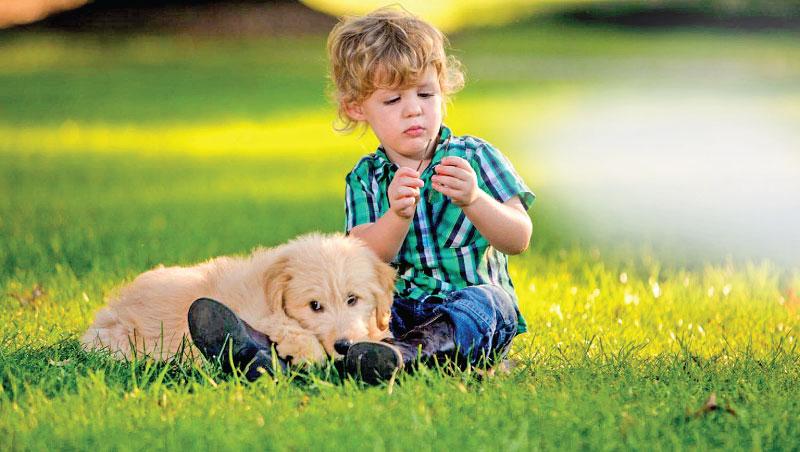
Teaching your children to be kind to animals today is our only hope for a kinder world tomorrow.
Let’s talk about puppy love. Not youthful romance! The love between a person and his or her pooch.
Every pet lover knows, canine and feline companions make for some of the best friends we could wish for.
As I write this piece, I realise that compassion and love towards animals is an acquired emotion within me. I grew to love animals because of the situations around me which means we all have the ability to do the same.
Owning a pet is a commitment that will last through the animal’s lifetime, perhaps 10 or 15 years in the case of dogs. And at the end of that commitment, you’ll face the grief and mourning that comes with losing a beloved companion.
Although young children shouldn’t be given total responsibility for pet care, teaching them the basics can keep them and their pets safe and sound. As a parent, you must be the one to decide the appropriate time to introduce a pet to the family based on your child's age, behaviour, maturity and interest. In making such a decision you will need to determine how much of the animals’ care you expect the child to be responsible for and how much you intend to be responsible for.
There are so many things that we can do to teach our kids compassion and empathy towards animals but a few simple steps can show them what the right thing to do is and help end animal cruelty. Kids learn responsibility by caring for their pets. Making sure that your family pet is getting food and water regularly is the first step for children to learn obligations and accountability. By taking care of pet-owning responsibilities, children grow as more responsible human beings.
Teaching kids to be kind to animals is as imperative as teaching them empathy, manners and sharing. While loving animals can come naturally to most children, they do not in most situations know how to behave around them. Kids innately have an attraction and a desire to care for animals. Given this foundation, there are many ways in which we can instill an even greater love and respect for animals in our kids.
Children can be aggressive towards animals, which is why it is important to show and teach them how to respect and be kind towards these four legged creatures that play with us, cuddle with us, listen to us and make us feel like the most special people on the planet the moment we walk through the front door.When your kids have a good understanding and interaction with animals, take it a step closer.Teach them compassion by pointing out that pets have feelings beyond getting hungry and thirsty. To ensure animal safety for kids, teach your child never to pull an animal's ear, tail or feet when playing and to not wrestle roughly with them. They feel pain. They feel ashamed if they know they’ve done something wrong and sad if they're ignored.
Many animals suffer unspeakable cruelty as people don’t understand that animals have rights, let alone the importance of having those rights. Animals are sentient beings! They do not have a voice, thus, we need to protect them and give them a voice. This is where the concept of animal rights is rooted. Since our furry, floppy-eared friends aren’t able to tell us how they really feel, we’re stuck staring into their puppy-dog eyes, wondering what kinds of thoughts are flying around behind them. Ask your kids to think about it from the dog or cat’s point of view: Why are you ignoring me? What did I do wrong?
Tell your kids that if they don't make time for their pet, it feels sad and depressed. Getting your kids involved in the day to day care and routine where your pet is concerned is an excellent idea.
You should encourage them to help with chores that they may consider fun, like walking or exercising the dog. These activities teach your children responsibility while allowing them to engage in the more positive aspects of pet ownership.
Besides walking or playing with the dog, fun activities can include brushing or bathing the dog. Again this depends on the age of your kids. Younger kids could be given responsibilities they feel capable of performing. Make sure that you give them something that they can handle. They will feel more empowered and better able to care for the pet if they complete an easy chore regularly as opposed to a more difficult one. Whenever your child helps care for your dog, you should let them know how much you appreciate it. As they get older you can limit the amount of praise you give them, but you should still congratulate them from time to time.
You should also introduce your child to the basics of hygiene and safety at this stage, and teach your kids not to kiss your dog or cat on its mouth and to always wash their hands after touching their pet.
Keep your pet's immunisations, preventative meds (heartworm), flea and tick treatment and check-ups current and up to date. It's to the benefit of animal safety, for kids to guard against disease.
Not only does this compassion and care for creatures benefit the animals of the world, but it also builds character and helps our children develop into well-rounded human beings that approach the world with a concern and respect for others. The love for animals actually teaches kids how to treat one another and how to be integral components of society.
